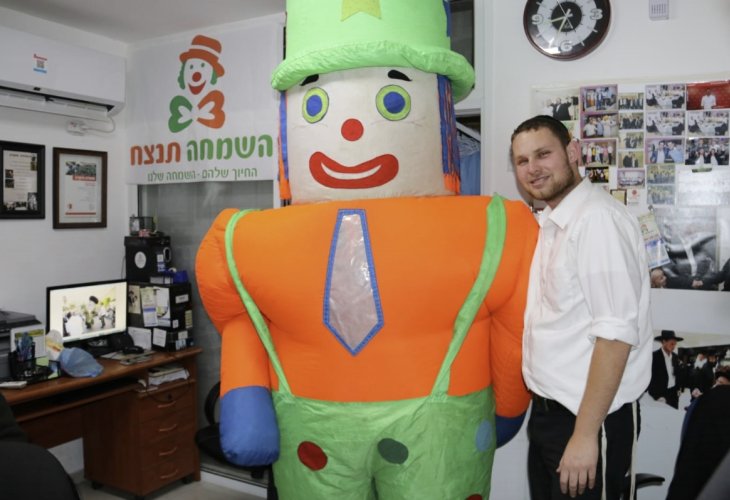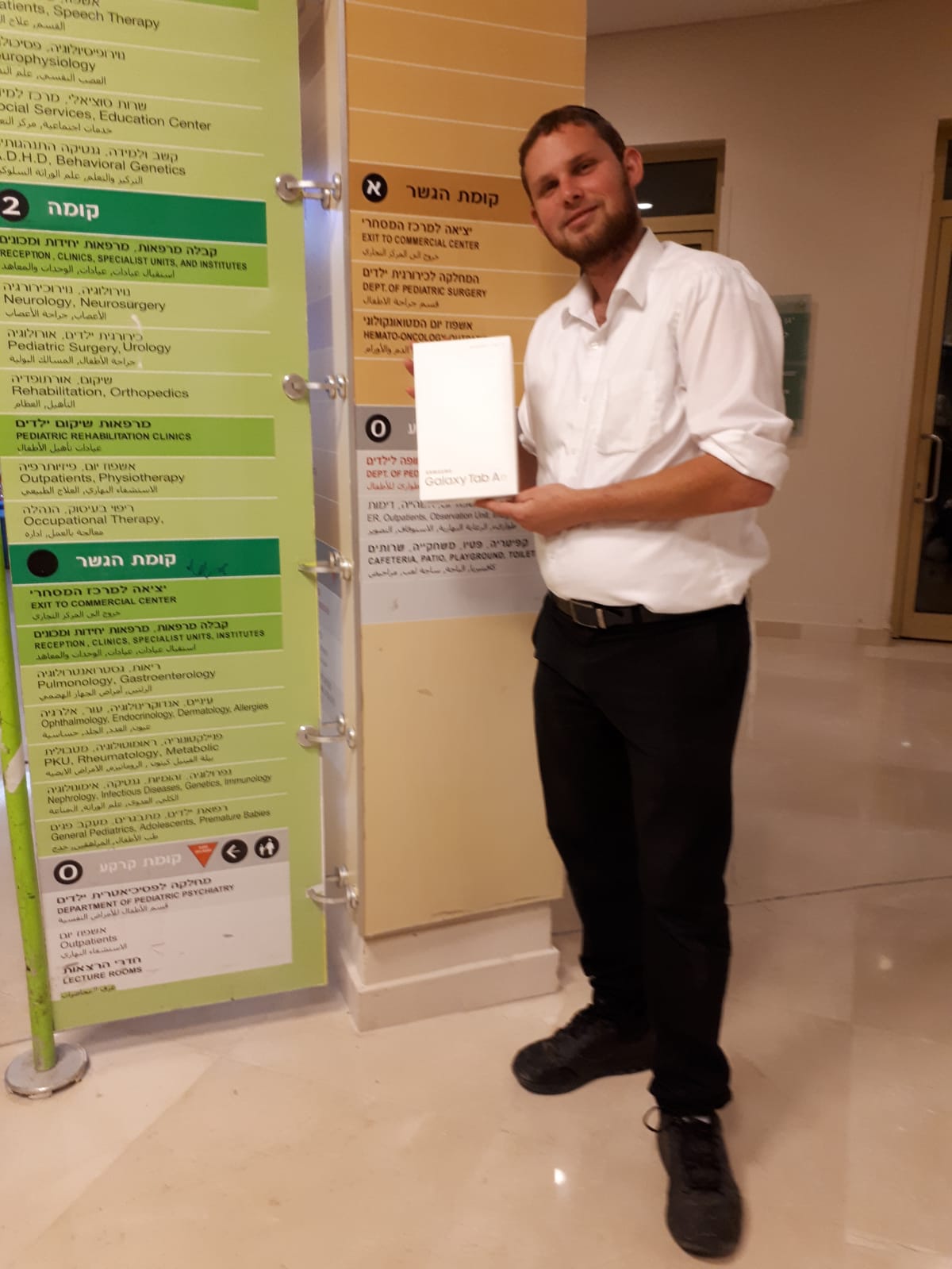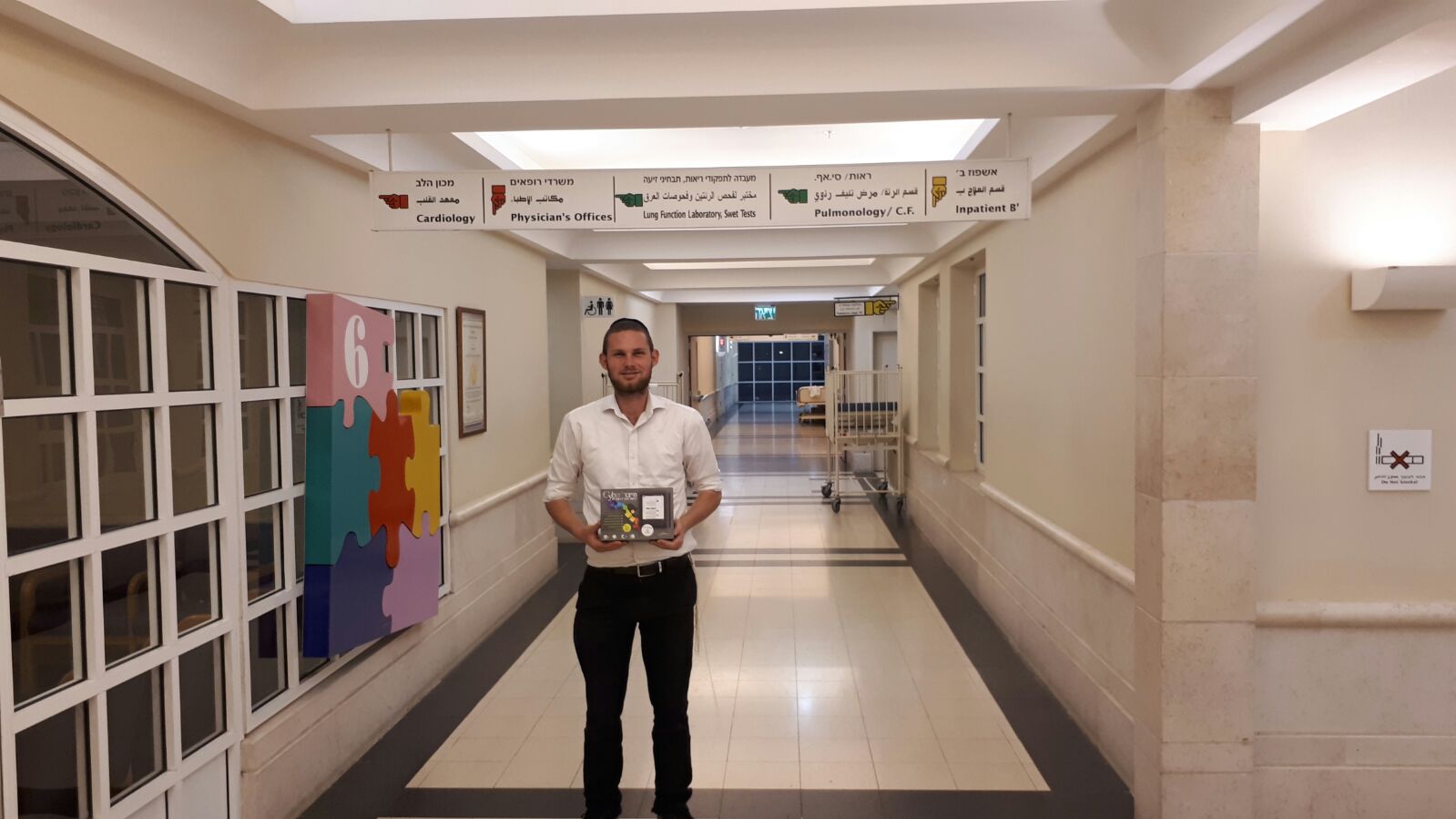How Do You Make an Oncology Patient Smile? An Inspiring Interview with Shmuel Gitler
"People think life and health are taken for granted." An interview with Shmuel Gitler, the entrepreneur behind the volunteer initiative spreading rays of joy in hospitals.
 Shmuel Gitler (Photo: Private Album)
Shmuel Gitler (Photo: Private Album)Shmuel Gitler may be only 25 years old, but he has already spent nine years bringing joy to Jewish hospital patients, including sick children. Shmuel volunteers his time and has established a national network of volunteers over the years, most of whom are Haredi. They typically head to hospitals daily, armed with the "weapon of joy": abundant good cheer, a desire to spread happiness, musical instruments, and large puppets. Gitler's team sometimes enters even the most challenging hospital wards, but they don't shy away from their challenging mission—to bring happiness. "It's not easy to make people happy; every smile from a patient is worth its weight in gold," says Shmuel.
Shmuel lives with his wife in Modi'in Illit. From a young age, he realized he wanted to make people happy. In his youth, he worked and saved money, which he used to buy giant puppets and sound equipment. "Kindness in the Haredi community is taken for granted," Shmuel says, "People give of themselves; we were brought up with the value of 'Love of Israel'." An encounter with a personal crisis during his youth also spurred him into action: "When I was young, I had a teacher who didn't believe in me. I began to believe I wouldn't amount to anything. This resulted in me neglecting my studies, among other things. At age 15, I had an open-hearted conversation with my uncle at a family gathering. I shared with him that I didn’t believe in what I was doing, and he restored my self-belief, got me back on track. I started to engage in acts of kindness, and over time, I noticed that doing good for others brought me immense satisfaction. At fifteen and a half, I saw for the first time how joy could uplift someone and decided to pursue it fully. I gathered some yeshiva students and a keyboardist, organized one joyful event, and the rest is history.
 (Photo: Private Album)
(Photo: Private Album)"We mainly brought joy to patients at home or hospitalized. Once you start, it encourages you to give more. Before formalizing the activities and before getting married, I was close to a sick child who inspired me. I was with him almost every day and saw the positive impact joy had on him. On the days we brought him joy, his medical condition improved—there was evidence in the field. It fueled me to continue. I was with him during the last year and a half of his life, during which I got married. Unfortunately, after the child passed away at age 10, I decided to formalize these activities. In his last days, my wife and I would visit him, and when we discussed a general name for our activity, he suggested: 'Joy Will Win'. So we went with that. Of course, I consulted with Rabbi Zilberstein before proceeding.
"Providing Relief from Suffering"
Shmuel says the volunteers do everything they can to bring people joy: "We do whatever it takes to make people smile. It's not necessarily medical clowning; anything that brings a smile works. Sometimes there are specific requests. For instance, if a child requests a magician, singer, or clown—we fulfill it. The goal is to meet the patient's request to relieve their suffering. So how does it work in practice? I have around 200 volunteers, most of whom are young Haredi men. Some are artists, keyboardists, magicians, acrobats, and we group them according to the nature of the activity. We have 11 different groups," explains Shmuel. Not everyone can be a volunteer: "There’s a selection process. Not everyone can handle being in hospitals. Although there are many requests to volunteer, it’s important that the volunteer who's coming to help others is not negatively affected. For instance, we had a case where a volunteer felt unwell physically because being in the hospital made him uncomfortable, not mentally but physically. I explain to them that we do not come to pity the patient or show them how unfortunate they are, but rather to help them forget their current situation for a time. We encourage and support them without experiencing the illness with them. We come with the aim to bring joy."
The volume of requests is high: "We receive a lot of requests," Shmuel says, "Unfortunately, there are requests daily, sometimes from parents, siblings, or close friends. Everything is done completely voluntarily. Our goal is to reach as many hospitals and patients in the field as possible and provide the best response. Concurrently, we respect the medical staff, of course, we do not disturb them and we respect the hospital's regulations. We have a project called 'Towards Shabbat', the goal of which is to bring the patients into the spirit of Shabbat. The guys come on Thursdays and Fridays, moving between the patients and injecting the unique atmosphere of Shabbat, which is, as we know, very different in a hospital setting compared to home. Once, we entered a room where the hospitalized patients were not observant of Torah and mitzvot, and we started playing Shabbat songs, and the patients got up from their beds and started singing along with us and clapping. It was touching to see how they connected to their Jewish essence. Besides that, we also work on fulfilling wishes outside the hospital walls, such as fulfilling a sick child's wish for a birthday party on a bus."
"Gives Perspective on Life, Saying Thanks for What Is"
Each group has a team leader whose role is not only to unite the team but also to check which rooms are appropriate to enter before going into a department. "For instance, it's not appropriate to enter a room where a patient has just come out of surgery and is in pain. Therefore, we ask beforehand. If they give their approval, the team enters with musical instruments and sings the songs the patient likes," Shmuel explains.
Isn't it difficult to deal with situations that are sometimes not easy?
"Over time, you develop emotional toughness. Unfortunately, we hear many stories about many sick people. However, it changes your perspective on life. Just the fact that a person can get up in the morning, walk on their legs, while unfortunately, there are people discussing death, who aren't independent, sometimes relying on staff to help them eat—it makes you say thank you for being able to leave the hospital, being alive and breathing. You have reasons to be thankful for what you have and to continue asking for the good.
 (Photo: Private Album)
(Photo: Private Album)"Joy is a coveted, essential, and lacking commodity. I see how much it's missing. It's not easy to make people happy, not easy to do it professionally. I did study medical clowning to professionalize and learn how to engage with patients, but it's not always easy. Sometimes a patient is feeling really down, surrounded by family, and there are definitely challenging situations, but we have the tools to turn the atmosphere around in seconds to something more positive. Everyone has their burdens and challenges meant to test if they can withstand them."
What drives you?
"When you see someone who’s been in a state of depression start to communicate with people and want more songs, it's different. Joy gives people life; it's a cure. One day I spoke with a doctor at the hospital, and he said to me: 'Know that there are cases where your activity, your volunteers, are much more important than what we do'. The medical field equally recognizes the seriousness of joy—there's no doubt about it. Volunteers themselves say they see changes in patients' conditions. There are things that can't be explained in words.
"Walking around hospitals, you encounter so many stories. Some people have been hospitalized for long periods for rehabilitation; some people call you angels— it gives you the adrenaline to continue. People are grateful for the time we’ve spent with them. We don’t fully realize what it means for a patient lying in a ward surrounded by four walls and a medical staff that enters with either good or bad news. Suddenly, we enter with a completely different atmosphere, which is not taken for granted—it's astonishing. Suddenly, the sound of machines is muted, and there’s an atmosphere of joy. We approach all departments, not just oncology patients. Anyone who enters the hospital walls needs joy."

